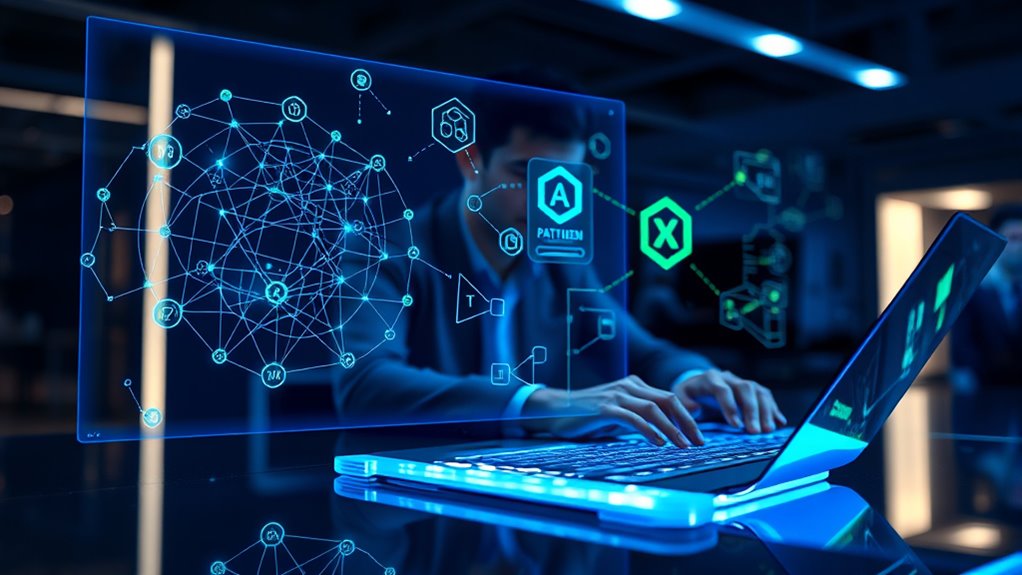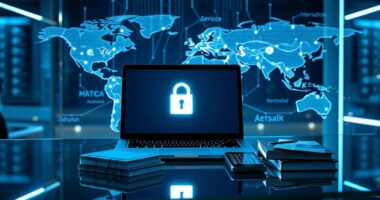In the age of generative AI, you face complex challenges around intellectual property. AI disrupts traditional ideas of authorship and ownership, making it unclear who owns AI-created works or inventions. Laws are still catching up, with some jurisdictions requiring human involvement for copyright or patent rights. As the legal landscape evolves, understanding these shifts can help you protect your creative and innovative efforts. Keep exploring to discover how policies are adapting to these technological changes.
Key Takeaways
- AI challenges traditional copyright notions by creating works without direct human authorship, raising questions about legal ownership rights.
- Patent laws struggle to recognize AI as an inventor, potentially leaving AI-generated inventions unprotected.
- Jurisdictional differences create legal uncertainties regarding rights and protections for AI-produced intellectual property.
- New legal frameworks may be needed to clarify ownership and rights for AI-generated creative and inventive works.
- Ensuring legal recognition of AI innovations is vital to foster continued innovation and commercialization in the AI era.

Have you ever wondered how artificial intelligence impacts the way we protect creative works? As AI becomes more advanced, it’s reshaping the landscape of intellectual property, raising questions about authorship, ownership, and legal rights. When AI generates original content—be it art, music, or written material—determining who holds the copyright isn’t straightforward. AI copyright, for instance, challenges traditional notions of authorship because, typically, copyright protection is granted to human creators. If an AI produces a piece of work without direct human input, courts and lawmakers are still figuring out whether that work qualifies for copyright at all. You might find yourself in a gray area when trying to assert rights over AI-generated content, especially as jurisdictions differ in their approaches. Some argue that only works created by humans can be copyrighted, which means AI-produced works may fall into the public domain or require new legal frameworks. Others suggest that if a human significantly guides the AI’s output, they could claim copyright, but the boundaries remain blurred. This ongoing debate emphasizes the importance of understanding the legal implications of AI copyright and how future legislation might evolve to accommodate these technological shifts. Furthermore, the integration of Aloe Vera Plant Problems and other plant-related legal issues can serve as a metaphor for the complex, evolving nature of AI law—both require careful consideration and adaptation. Beyond copyright, AI also has considerable patent implications. When AI systems invent or innovate, questions arise about who owns the rights: the programmer, the user, or the AI itself? Patent law traditionally requires an inventor to be a human, but as AI systems generate inventions with minimal human intervention, this creates complex legal dilemmas. For example, if an AI develops a groundbreaking pharmaceutical compound, can the entity that created or trained the AI claim the patent? Or does the AI itself have any rights? Currently, patent offices worldwide lean toward recognizing human inventors, making it difficult for AI-generated inventions to secure patent protection without clear human involvement. Nonetheless, these questions are pushing policymakers to revisit patent laws, considering whether new categories are necessary to protect AI-driven innovations. The implications are substantial because, without proper legal recognition, AI-generated inventions risk being unprotected, which could stifle innovation and commercialization. In essence, as AI continues to advance, it compels you to rethink traditional notions of intellectual property. Whether dealing with AI copyright or patent implications, the legal landscape is evolving rapidly to address these unprecedented challenges. You need to stay informed about these developments, as they’ll influence how you create, share, and protect your own works in this AI-driven era. Navigating this terrain requires understanding both current laws and potential future changes, ensuring that your rights are safeguarded amidst the rapid growth of AI technology.
Frequently Asked Questions
How Does Ai-Generated Content Impact Copyright Ownership Rights?
You might face authorship ambiguity with AI-generated content, making it unclear who owns the copyright rights. This uncertainty can complicate establishing infringement liability, as it’s often difficult to determine if the AI or user is responsible. You need to carefully review legal frameworks, as current laws may not fully address these issues. Staying informed helps you protect your rights and navigate potential disputes involving AI-created works.
Can AI Be Held Legally Responsible for Infringing Intellectual Property?
You might think AI can be held responsible for IP infringement, but it’s more complex. AI itself doesn’t have moral responsibility or legal accountability. Instead, creators and users hold the ethical and legal duties, ensuring responsible AI use. While AI ethics emphasize accountability, current laws don’t assign legal blame to AI systems. So, ultimately, humans are responsible for any IP violations AI commits.
What Are the Licensing Challenges for Ai-Created Inventions?
You face licensing complexities with AI-created inventions because AI authorship blurs traditional ownership lines. When AI generates content, it’s often unclear who holds the rights, making licensing agreements difficult to establish. You may struggle to determine whether rights belong to the developer, user, or AI itself, complicating legal protections. Charting these licensing challenges requires careful crafting of contracts that specify rights, responsibilities, and usage permissions in this evolving landscape.
How Do Existing Patents Apply to Ai-Generated Innovations?
You should know existing patents might cover AI-generated innovations if the patent scope includes methods or inventions similar to your creation. However, infringement risks arise if your AI output closely resembles patented work, so you need to carefully review patent claims. This helps you avoid legal issues and guarantees your innovation doesn’t infringe, especially when AI’s role blurs traditional boundaries of patentability.
What Legal Protections Are Available for Ai-Created Works?
Think of legal protections for AI-created works as a tricky maze—you might find some paths, but others are blocked by ethical and moral considerations. Currently, copyright laws generally don’t recognize AI as an author, leaving AI-generated works in a gray area. You must navigate these murky waters carefully, considering ethical implications, because the law hasn’t fully caught up with the creative power of AI, and moral considerations often shape future regulations.
Conclusion
As you navigate the evolving landscape of AI and intellectual property, remember that protecting your creations is like fencing a garden—you need clear boundaries and smart strategies. While generative AI offers endless possibilities, it also challenges traditional rights, so stay informed and proactive. By doing so, you’ll make certain your innovations flourish like a well-tended orchard, thriving amidst the rapid growth of technology. Embrace these changes wisely, and your ideas will continue to blossom.










